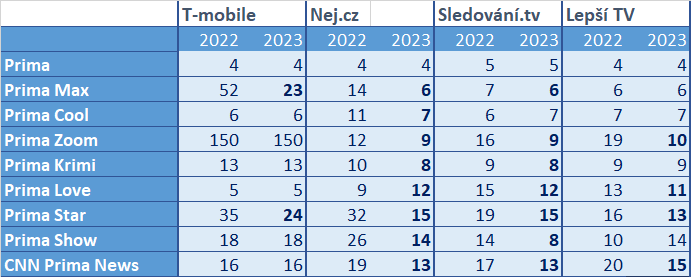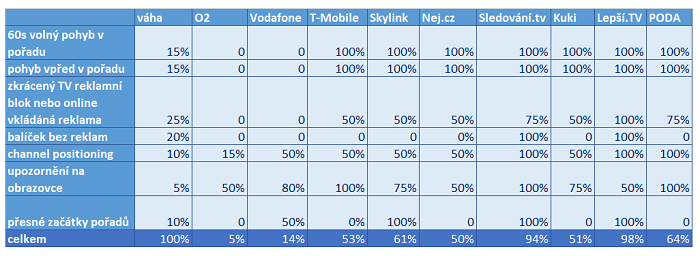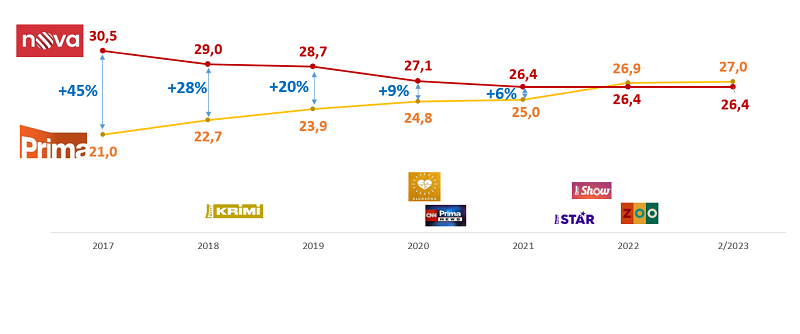PRIMA: SKIPPING COMMERCIALS WAS A BIG DRAMA, BUT THE EMOTIONS HAVE SUBSIDED
For three quarters of a year now there has been a ban on skipping ads in the back view of IPTV operators in the broadcasts of Prima group TV stations. What the measure has brought and what the next steps will be, representatives of the Prima group explain.
The MediaGuru.cz editorial team talked to Lukáš Kubát, Petr Milo and Michal Stárek from the Prima Group about the possibilities of blocking skipping ads and further plans in the field of internet television. They assess the step, which the Prima Group has taken on 1 June 2022, as a success. "We have saved over 20 thousand advertising GRPs. That's about 150 million crowns," they say. Prima representatives also spoke about how they plan to implement the content of the new Prima+ video library into the operators' offers.
On the first of June it will be a year since operators had to deploy one of the solutions you suggested regarding skipping ad blocks on Prima Group channels. How do you evaluate this step from your point of view in hindsight?
Lukáš Kubát: We see it positively, because we have saved the GRPs from which we finance our production, and the GRPs are no longer getting lost somewhere. We have secured the monetization of the viewer because IPTV is growing and gaining importance. If we let that go, like timeshare viewing, the problem gets exponentially bigger. In 2021 we lost around 30k GRPs, by 2022 it would be 40k. The increase is dozens percent if we wouldn’t act. By stepping on the brake and asserting our rights, the market has somehow gotten used to it. It was a huge drama, but I think the emotions have subsided and the operators can see for themselves that as long as they implement solutions that improve the user experience (e.g. shortened ad block, fast-forwarding of content, 60-second window with the ability to fast-forward ads at the start of viewing, accurate show starts), nothing terrible happens. We understand that this has been difficult from the operators' perspective, and we appreciate their constructive engagement with us.
You obviously commend the move as a good decision, but the operators were not so happy. They mostly agree that this is a constraint that severely limits viewer satisfaction. One of them even called the move illegal.
Lukáš Kubát: We see it as a way to re-establish the value of our content. It was kind of a preface to our VOD platform. If our content is to have any value, we can't give it to people for free, because in the world of content, the person who created it has to live off something, and that's either advertising or subscriptions. If I'm putting an ad out there and someone says, "Hey, don't watch that ad. Just look at the content." - then it stops working for me financially. That's why I'm glad that today we can offer our viewers the Prima+ service, where the Premium tariff allows you to watch our content without ads.
The obligation to block ad skipping, or your agreement with the operators, has been in place for about three quarters of a year at this point. So is this model set up well in your opinion?
Lukáš Kubát: From the feedback from operators, we see that the most dissatisfied are those who have not implemented any improved solution that Prima allows, and have only disabled forward scrolling for both the program and ads. I would imagine that some of the larger operators will click something in their platform and say, "Sure, don't skip the ad, skip the content." That it would be that simple. It shows the less flexible approach of some of the big ones, and conversely the flexibility of the small operators.
Petr Míl: We have provided compensation for the ad skipping ban and some technical means to improve the user experience from a different perspective. We have offered operators precise start times for shows and the user doesn't have to search for them. We also made it possible to skip ads after a few minutes.
Lukáš Kubát: When we talk to operators after nine months, this is the point they really appreciate. The operator says: Leaving aside everything that bothers me, the punctual start of shows really improves the viewer experience. When a viewer watches a show and has the option to skip, finding the exact beginning is a bit more annoying than having the show start exactly where it's supposed to start.
I would go back to April last year, when the Chamber of Commerce held a meeting with representatives of some of the operators and invited journalists. One of the visibly dissatisfied operators was 4net.tv, which even then expressed its dissatisfaction with the fact that this was a one-sided solution that had not been discussed with them. This is also confirmed by T-Mobile, which complains that there is a lack of sufficient discussion between media houses and operators to address the issue. The operator has repeatedly asked for standardisation of the technical solution and approach to playing advertising blocks, but unfortunately this has not happened. Why?
Petr Míl: Because standardization could not be found, we came up with our own solution and we offer that it can easily become a standard.
When I followed the discussion and the criticisms at the time, my understanding was that the operators did not have a manual that clearly told them what to do and that, on the contrary, these conditions were set out, I don't know if I'm using the right word, in a lax way, and that each operator had to deal with it on his own.
Lukáš Kubát: We had it described in general terms, because the brief was simple: disable ad skipping. Some operators made it a problem because we found out that they buy the platform somewhere, for example, and therefore they have to have a detailed specification for their supplier and they have to set it up. I understand that it would be easier if there was a technical bible that described the terms exactly. We told the operators how we wanted to do it, but we conducted it as a dialogue. It's hard to please everyone when introducing a new solution. If we came in and said, here's the documentation, we'd be looking forward in nine months when it's done. We said to the operators clearly, the problem is with you and you are allowing customers to skip advertising in timeshifts, so please prevent it. The discussion has been going on for two or three years and historically there has been an effort to get operators to ban this.
But nothing has been actively done about it...
Lukas Kubát: We told the operators that we would give them the technical cooperation to say where the pause starts and where it ends. We will "tag" your program and you have to tell us where the standard is. We found two in the world. One is the API and the other is SCTE-35 (the markup that US regional TV used to use, ed.). You tell us what kind of tagging you would like and we will give you the technical cooperation. And the operators then make sure that when that marking occurs, it's impossible to skip the commercial.

Popis tabulky: Improving the ranking of Prima Group stations on operators' menus in 2023

Popis tabulky: Evaluating the solution to the ban on skipping ads in delayed viewership
So, the current situation is that this obligation somehow works for operators, and one of them even allows you to insert online advertising, which is the optimal solution for you. What is your next plan and where should it go from here? Is it optimal for you to have multiple solutions or would only one model be optimal for you? T-Mobile has written to our editorial team that from June 1 they plan to extend the ability to skip an ad block after three minutes to four.
Lukáš Kubát: We announced this plan, where we would go for the possibility of skipping ads after three minutes, which is half of the ad break, to operators at the Chamber of Commerce in September 2021. Here we also mentioned that we plan to increase from three to four minutes in the future. There is no reason why an IPTV viewer should see fewer ads than any other. We want to keep it at eight minutes for now. For operators who will have the option of embedded online advertising, the limit will not change and will remain at five minutes.
Operators also said that their statistics show a drop in the viewership of Prima Group programmes in back-to-back viewing, but did not give any specific figures as this is internal know-how. Do you have any statistics in this respect?
Lukáš Kubát: We do not have data from the operators. They mention it, but sometimes it is difficult to distinguish in their view when it is TV season and when it is the so-called off season. Operators saw a decline in the summer after the introduction of this condition, which was on June 1, but this is a decline that happens every year and should be compared year by year rather than month by month. We don't see a significant drop in viewership from the data we get from Nielsen. We see that Prima's viewership is growing and that we have grown from a share of 25% to 27% in the 15+ audience group. We see that IPTV is not growing as fast, it's flattened out more. We are seeing some impact but it is not material. We are growing as a group and we are happy.
Petr Míl: There may have been a slight change in user behaviour where, if they have disabled the ability to skip ads, they can watch our show live and on a competitor's TV they can watch the show from a recording and skip the ad. For us, viewership remains because whether the viewer bites into the show live or in delayed viewership is irrelevant to us.
The chart you presented to us shows that in the 15+ group you have managed to reduce the gap between you and the Nova group over the years. Clearly, then, you don't see this as a fundamentally bad decision. So did everything turn out as you expected for you?
Lukáš Kubát: Exactly. 22,000 GRPs saved is approximately 150 million crowns for us, so in six months we are about half of what we set out to do. We said we were losing around 300 million, so we consider that number confirmed.
I also asked on the internet about customer satisfaction of individual operators, who understandably see it as viewer discomfort. Generally speaking, those who don't care or can tolerate this restriction are very few. Quite often there have been comments that the viewer has stopped watching Prima altogether, or doesn't understand why this step is being taken when there are usually more than a hundred programmes available on pay services.
Petr Míl: The basic view is that we are funded only by advertising money. In order to produce shows that users watch, we need them to watch advertising. By skipping advertising, they have made it impossible for us to fund production.
Lukáš Kubát: It's a tough view of the viewer and I can put myself in their shoes. In their campaigns, the operators enticed viewers to skip the ads. But they didn't have the rights to buy it. So it's a problem on the part of the operators who historically have not informed their customers correctly. The operator said: "I'll get a new customer from terrestrials, they can watch shows on delay, skip ads, and save a lot of time." No one addressed how the operator would deal with Prima. The viewer doesn't see it.
And, as we have already said, there will certainly also be a difference in the perception of these moves by customers of different operators. If viewers are with operators that have fully integrated all the options we have enabled for IPTV operators (such as sledovani.tv), they certainly don't feel the discomfort of watching shows as strongly as viewers of operators that have not taken advantage of these options. However, we believe that the situation will improve in this respect in the future.

Popis tabulky: Daily viewership results in 15+, source: ATO - Nielsen Admosphere, live + TS0-3, as of 1. 3. 2023
The ability to rewind is undoubtedly one of the benefits of IPTV or internet TV, so you can't blame customers for not liking it when people have this functionality taken away.
Petr Míl: It should be emphasised that we do not prohibit rewinding of programmes, we prohibit rewinding of advertising. The fact that some operators have done this by banning replays of our programmes altogether is their decision.
O2 has solved the ban on skipping commercials by banning the ability to rewind altogether. At the beginning of last year, there was already an information bar on your stations that the operator's clients would lose your programmes within a few weeks, which in the end did not happen. So what are your current relations with one of the biggest operators on the market?
Lukáš Kubát: We are glad that we finally signed the contract. In February we did not have it yet. But the essence of the problem was that they were distributing our channels without a valid contract.
This big operator was distributing your channels without a contract? That’s hard to believe.
Lukáš Kubát:We couldn't agree on new terms. One of them was the implementation of limiting ad skipping. The contract said that we would implement it within a year. We said to them, "You are aware that we are implementing a ban on skipping." And that was actually one of the points of the conflict we had.
Michal Stárek: All the operators have committed to these conditions by a certain date, and only O2 said no.
So where do your relationships stand now?
Lukáš Kubát: We have a contract, the relations are normalised and good.
Okay, but as far as the positioning of your programmes in the O2 TV offer is concerned, it's not quite optimal. After the inclusion of the channels of the Nova group in better programming positions, your stations were moved to worse preferences.
Lukáš Kubát: We cannot influence the operator to place us on particular positions that we have not agreed on. In particular, the operator O2 perceives the situation in such a way that if it cannot offer the viewer an improved quality of content or user experience, it will say that it does not want to have these programmes at the top. So, while we are in the top 30, we are not quite in the premium positions. O2 and rival group Nova have the same owner, taking out our positions without the ability to negotiate and replacing them with Nova group channels seems to us to be problematic from a competition perspective.
Petr Míl: Unlike O2, we have agreed with some operators to place our channels in better programming positions.
I will ask about that in a moment. Can you tell us what the distribution agreements with the operator generally contain? I understand you can't comment on specific agreements with individual operators, but can you say what you are looking out for in them?
Lukáš Kubát:To put it simply, we sell our channels. We sell them either in live mode or in delayed viewing mode. IPTV has both contracts because it offers timeshift and within that there is a start over, a seven-day timeshift, and of course there are defined terms and conditions on how the content can be handled. For example, it treats how many simultaneous streams can be broadcast, how many devices can be registered, etc.
My colleague indicated a moment ago that several operators have moved your thematic clones to more attractive positions this year. How have you done that?
Lukáš Kubát: We offer a discount for premium positioning of our programmes, but we will not disclose the amount.
Let's go back to O2 TV. You have a contract, but the relationships are probably not the best right now. Are you still going to negotiate with them?
Lukáš Kubát: We definitely want to build long-term relationships with operators that work, and we are interested in having our channels in the top positions, but it's always a question of agreement. I believe that this will improve in the future.
In our interview, you mentioned your new video library prima+ several times. Will you try to implement its content directly into operators' offers in the future?
Lukáš Kubát: The new service allows us to expand the range of content we can offer to the viewer. Naturally, we want to make this content available to operators. We will look for a form of cooperation and we are talking to operators about what is a good business relationship, setup, display, integration.
So you're at the beginning...
Lukáš Kubát: Exactly. We want our content to reach the viewers and the operator is the aggregator that has the ability to offer that to the viewers. Viewers should be able to watch ZOO in preview or watch it without commercials, both options are offered by Prima+. If a seven-day archive is not enough and he wants to watch all the episodes, he has the option. We want to expand our relevance with operators and offer viewers the widest possible range of audience favourites.
Source: mediaguru.cz




